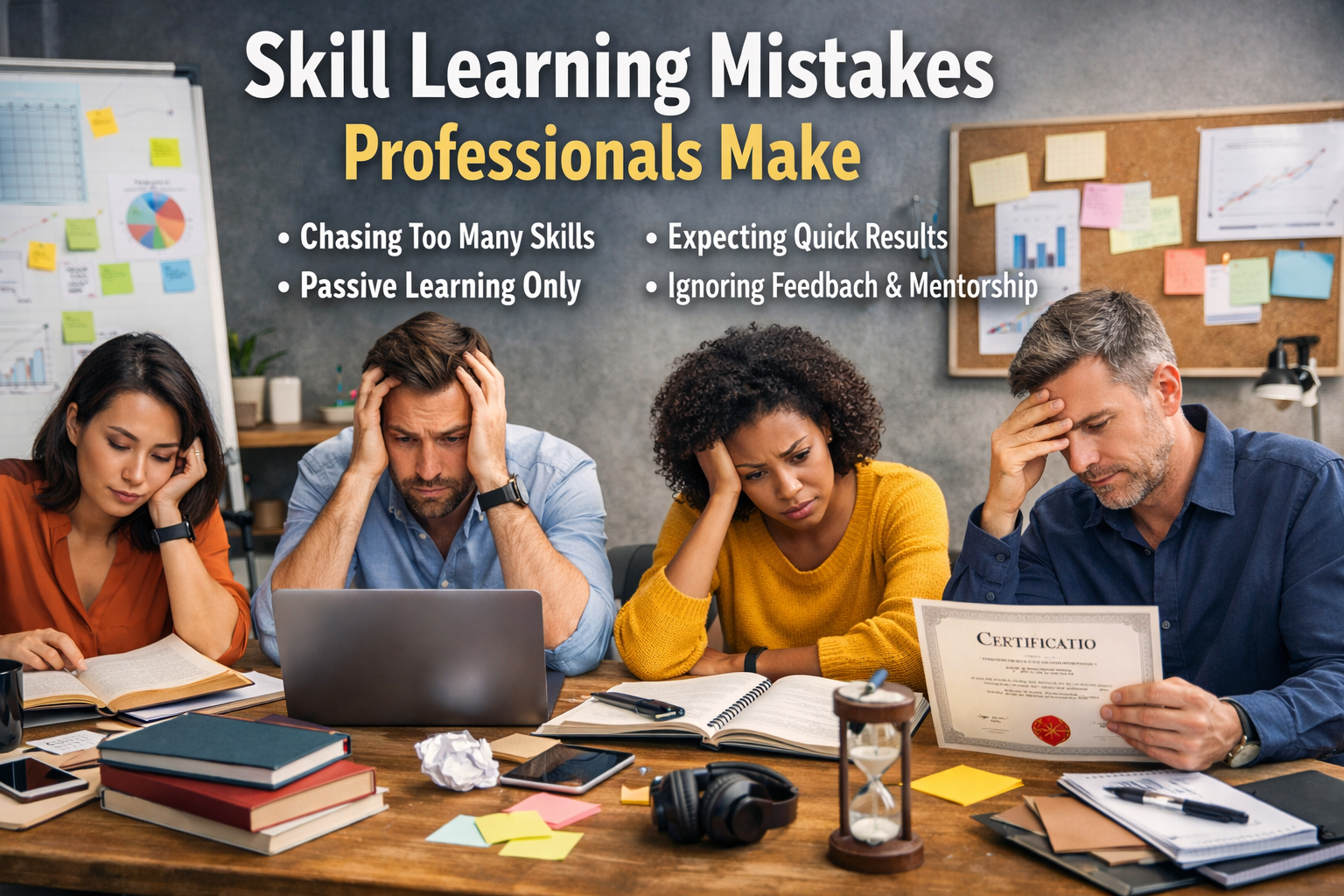Introduction
To get any job, skills are the main requirement. Without skills, we cannot perform any job effectively. Even a mason needs skills to build a house — so just imagine how important skills are for an educated person or someone in a reputed job.
There are certain skills that are essential to learn because they will be in high demand by 2030. If we prepare ourselves today, we can build a strong and successful career in the future.
This article highlights all the career skills that will be in demand by 2030 — take a look and start preparing for the future.
Why Future Skills Matter?
- Impact of automation and AI on traditional jobs
The world of work is changing faster than ever before. Automation and artificial intelligence are transforming traditional jobs and creating new ones that require advanced digital and human skills. As machines take over repetitive tasks, employers now look for professionals who can think creatively, solve problems, and adapt to change.
- Shifting focus from degrees to skills
The focus is gradually shifting from having a degree to having the right skills. Companies today value what you can do more than what you studied. This shift has opened doors for self-learners and professionals who continuously upgrade their abilities through online learning and practical experience.
- Rise of hybrid work environments
The rise of hybrid and remote work environments has also changed how we collaborate, communicate, and manage time. Flexibility, digital fluency, and adaptability have become essential traits for success.
- Demand for adaptability and continuous learning
In this fast-evolving world, the key to a secure and successful career lies in continuous learning. Those who keep updating their skills will not just survive — they will thrive in the future job market.
Top Career Skills That Will Be in Demand
1. Artificial Intelligence (AI) and Machine Learning
- A data analyst cleans data and creates dashboards and reports, which help in business decision-making.
- Data scientists create predictive models and AI/ML algorithms so that companies can understand the market trends and customers.
Skills/Tools:
Python, R, SQL, Tableau, Power BI, Tensor Flow, Pandas, Excel.
Analysis can be done remotely because data online is available and only tools and cloud resources are important for processing.
2. Cybersecurity
In today’s digital Era, cybersecurity is a field that is growing super fast. Every company needs a skilled professional to secure its systems, whether small or large. That’s why the demand for cybersecurity professionals is increasing every year, and this demand will increase further.
Cybersecurity is not only a stable career, but it is also a highly paying and growth-oriented one. But starting can be challenging, like which escape you have to learn, how to find the right job opportunities, and how to shape your career, all these can be confusing for a beginner.
But the only solution is using the right job tool. The Best Job Tool is a platform that helps job seekers because it is especially designed for job seekers, where you can find verified and relevant jobs only. The features of the Best Job Tool, like smart filters, skill-based matching, and verified jobs, give you strong support to start a cybersecurity career.
3. Cloud Computing
- Cloud engineers create secure and scalable cloud solutions for companies.
- Data migration to cloud.
- Designing security and backup solutions.
- Doing scalable storage and networking setup.
Skills/Tools:
AWS, Microsoft Azure, Google Cloud, Docker, Kubernetes.
It can be easily handled with remote work because the work of the cloud happens on online servers and platforms.
4. Digital Marketing
They are the online face of a brand or company. Their main work is to grow a brand on social media platforms such as Facebook, Instagram, LinkedIn, Twitter, TikTok, and YouTube, and engage with the audience.
Their common works are,
- Creating creative posts, reel, videos, graphics, and scheduling them according to the calendar.
- Making different strategies for every platform to increase engagement and reach.
- Building relations by answering followers’ questions, comments, and messages.
- Analyzing which posts are performing well, how much engagement they have, and which type of content the audience loves.
- Optimizing campaigns and running Facebook ads, Instagram ads, and LinkedIn ads.
The work of a social media manager is not only making posts, but they also have to build the reputation of the brand, increase sales, and maintain long-term relationships with the audience.
5. Data Analyst
The work of a data analyst is to analyze large data sets, identify trends and patterns, create dashboards, reports, and provide important Insights to businesses. A remote data analyst interprets the data of a company with the use of tools such as Excel, SQL, and Power BI, and helps them in decision-making.
6. UI / UX Design
UI (User Interface) designers design the look and feel of a website or app. Basically, the things which are shown on the user screen, such as button, color, font style, are all part of UI design.
UX (User Experience) design
It makes the user journey smooth and easy. UX designers ensure that users feel simple, logical, and comfortable experiences while using the app or website.
Example: searching for a product and checking out is fast and easy in a shopping app, and that is because of UX design.
7. Product Management
A product manager is very important in product-focused companies such as app e-commerce and Saas. Their focus is on conceptualizing, developing, and launching a product.
Responsibilities :
- Analysing market research and competitors.
- Understanding the needs and feedback of customers.
- Designing a product road map and setting priorities.
- Coordinating with developers, designers, and marketers.
Remote product managers used tools such as Notion, Miro, and Figma to collaborate with the team and manage the product life cycle.
8. Project Management
It is a support role that assists the project manager. The role of a project coordinator in a remote project is very important because they ensure that documentation and communication are smooth.
Key responsibilities
- Working as an information bridge between the client and the team. Coordinators mostly work on Google Workspace, MS Office, and project tracking tools in remote settings.
- Managing meeting schedule and timeline.
- Providing a status report to stakeholders.
- Handling documentation and file management.
9. Blockchain Developer
- Design and build the architecture of blockchain systems.
- Develop security protocols and consensus algorithms.
- Maintain and improve blockchain networks.
Skills/Tools:
JavaScript, Python, Solidity, C++
Code can be written anywhere you just need a laptop and the internet. The whole team can work globally with the help of collaboration tools like GitHub and GitLab.
10. Financial Analyst Job
Financial analysis is a business advisor. They analyze data and tell management where to invest, where to cut costs, and how to plan the growth of the business.
Day-to-day activities of a financial analyst:
- Budgeting for casting
- Financial modelling
- Creating an investment report.
Analysts present data using advanced models of Excel, Power BI, and Tableau. Reports and dashboards can be remotely shared easily. This role is in high demand in investment banking, fintech startups, and MNCs.
Conclusion
This article covered the most important career skills that will shape the future of work by 2030 — from digital and technical skills like AI, data analysis, and cybersecurity. It also highlighted why future skills matter in a world where automation and technology are rapidly changing traditional jobs.
By understanding and developing these skills, you can stay relevant, confident, and competitive in the job market. Whether you are a student, working professional, or freelancer, focusing on continuous learning and upskilling will help you build a sustainable and future-proof career.
In simple words, the more you learn, the more opportunities you create for yourself in the future.







Leave a Reply